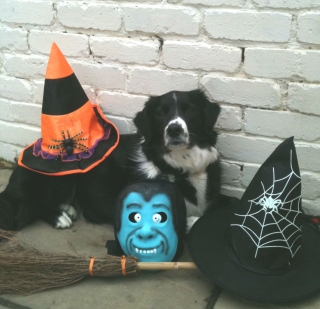Spooky......

People, who know me, may have thought I’d lost my mind this week. I usually keep to myself on dog walks. I enjoy the tranquility with my own dogs to play & train, since I spend so much work time with other people & their dogs. This week I was seen to approach strangers, chat to the lollypop ladies, mount an empty bus & dance up and down the aisle several times & stand rattling a plastic sign in the wind for no apparent reason. We approached & chatted to other willing dog walkers, stood by two surfing dudes while they stretched & prepared their boards. I even discussed pneumatic drills with some hard hat clad work men. The final act leading to the questioning of my sanity was my appearance in the kitchen wearing a witch’s hat, a black wig, a scary mask & brandishing a broomstick.
It’s been known for quite some time that dogs can go through a secondary fear period during their journey to adulthood. It should be said at this point that certain breeds are more prone to the spooky stage & inherently suspicious breeds such as collies & GSD’s can be even more sensitive. It can happen any time from 6 months onwards and it’s usually when owners will call me to mention that situations or things which previously didn’t cause alarm, their dogs were now reacting to, scared of, or barking at. If not handled carefully, dogs can become desocialised or reactive during this period, detrimentally so. This reduces the dog’s ability to cope with life in general & their owner’s willingness to take them out and about due to fear of how their dog will react. Essentially what happens between the ages of 6 months and 2 years, despite early socialisation, has a lasting effect on your adult dog’s personality.
My shy boy Guinness has blossomed since we got him at 8 weeks. He was a reserved little puppy, but with careful and considered socialisation & exposure to plenty of positive experiences, he has taken life in his stride thus far. Halloween celebrations began this week & coinciding with that, Guinness has surprised me by becoming spooky. I’m certain he’s not getting in the mood for the holiday season, rather I think the dreaded fear period has hit. He has baulked at things which previously he wouldn’t have cared about, dogs barking in the distance, a child in a witch’s hat, an appliance out of place on a back lane & the window cleaner. He spooked at a ceramic statue while on a walk & while the wind was causing things to blow around, he took it all very personally. The funniest reaction was to a parrot wall-hanging which a training colleague had to actually take from the wall & allow him to sniff, he was so convinced the ceramic creature was out to get him.
Quite often, pet dog owners don’t know how to proceed with their suddenly spooky dog. They avoid situations & events, often resulting in a more extreme reaction on the dog’s part when they do encounter certain things. This spiral of desocialisation happens frighteningly quickly until the dog is no longer walked or taken to new situations. The most common example I see, would be dog/dog reactivity, leading quickly to full on dog/dog aggression. Second only to this, dogs that are fearful of strangers while out and about. Cute puppy is not longer fussed over by members of the public, cute puppy suddenly smells like an adult dog as hormonal changes occur. Both these factors mean that humans & other dogs alike react differently to your ever growing hound, causing havoc with the anti-social behaviour you’re experiencing from your dog on walks.
So when my happy go lucky little collie boy started his strange behaviour this week, I was surprised & a little shocked. However it’s meant a concerted effort on my part to get him out and about more. Armed with chicken roll, or tasty liver cake, we take our time as we walk around the big bad world so that he can absorb & compute all situations, to realise that his fear is unfounded. Good old fashioned classical conditioning works wonders to convince your teenage dog that the spooky is not so scary after all. A reminder to all that socialisation doesn’t stop when your dog is no longer a puppy. In fact it’s often more important to work through the teenage stage, in order to emerge at the other end with a well adjusted, adult dog.




